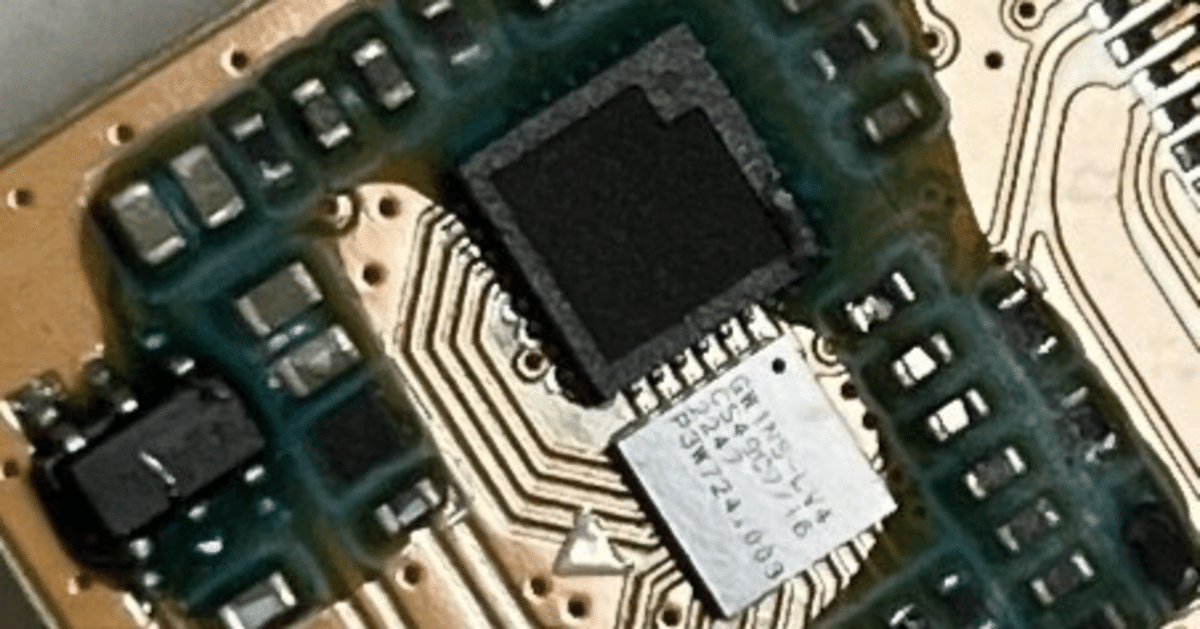
15.レジスタを実装して分周回路付きPWM発振回路を作る
ここではCPU側に対しての一般的なインターフェースとレジスタを実装するとともに分周回路を持ったPWM発振機能を持つ回路作成について触れていきます。
静電写真系のプリンタエンジンにおいて、そのハードウエア制御で本機能はとても重要です。(高圧制御とか)
問題
以下の回路モジュール(分周・PWM発振)を作成してください。
<レジスタ解説書(分周>
アドレス 属性 解説 データ
0x00 リードライト 分周値設定 下位2bit
(データ”00” 1/4分周)
(データ”01” 1/8分周)
(データ”10” 1/16分周)
(データその他 1/4分周)
#0x は16進数表記
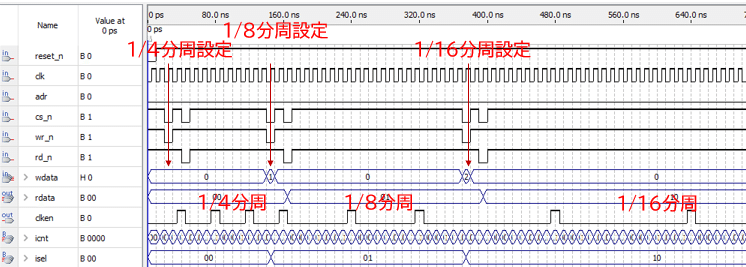
<レジスタ解説書(PWM>
アドレス 属性 解説 データ
0x00 リードライト 1周期期間 8bit
0x01 リードライト Lレベル期間 8bit
0x02 リードライト 発振ONOFF 1bit
(データ’0’ 発振停止)
(データ’1’ 発振)
#1周期期間・・分周の値による
(例:最小単位1:1/4分周ならば4clk)
(例:最小単位1:1/8分周ならば8clk)
(例:最小単位1:1/16分周ならば16clk)
# Lレベル期間・・分周の値による
(例:最小単位1:1/4分周ならば4clk)
(例:最小単位1:1/8分周ならば8clk)
(例:最小単位1:1/16分周ならば16clk)
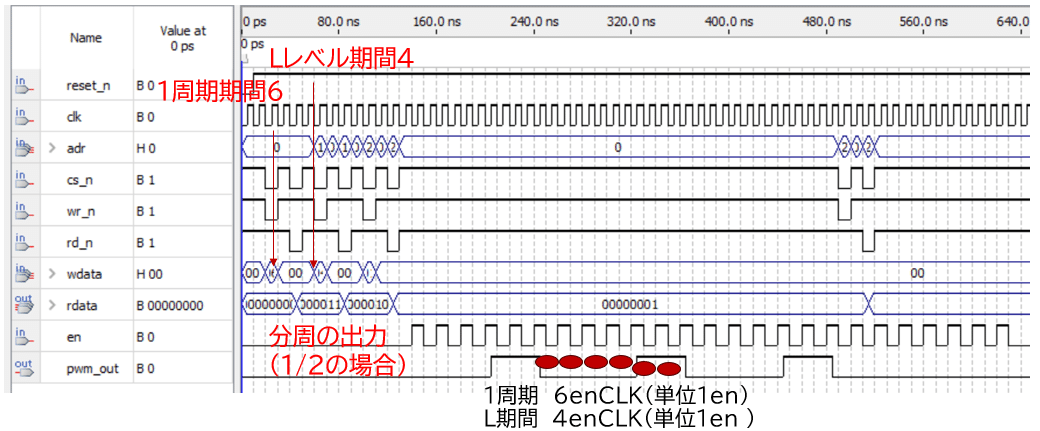
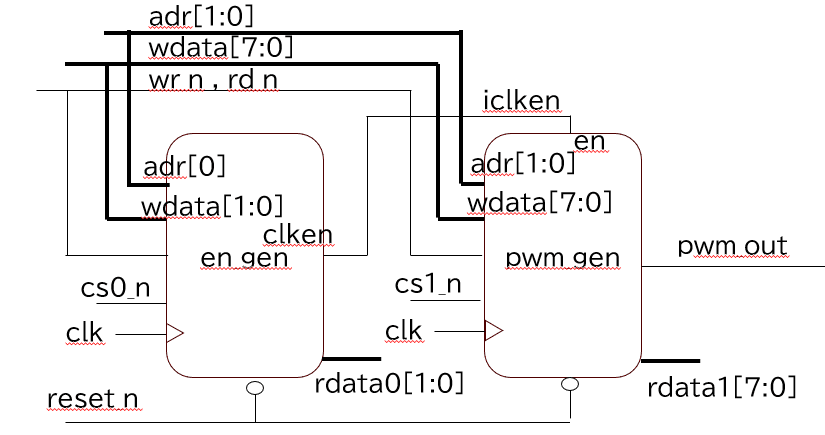
さてどう作る?
シンボル図・回路図にある通り、分周回路(en_gen)から出力されるiclkenをPWM発振回路(pwm_gen)に入れることで、PWM発振の時間の粒度(時間の最小単位)を変更できるようにします。こうすることで、PWM発振回路を変えずに対応レンジ(1周期時間等)を広げたりすることができるようになります。
VHDLで書いてみる
まず分周回路のen_genです。フリーランカウンタを作って、カウンタの値が
”0011”の時は1/4分周(4clkに1回clkenをH)
"0111"の時は1/8分周(8clkに1回clkenをH)
"1111"の時は1/16分周(16clkに1回clkenをH)
を出すようになっています。最終的にどれを使うかは最下段のprocess文の通り、レジスタの値によってセレクトされます。
library IEEE;
use IEEE.STD_LOGIC_1164.ALL;
use IEEE.STD_LOGIC_ARITH.ALL;
use IEEE.STD_LOGIC_UNSIGNED.ALL;
entity en_gen is
port ( clk :in std_logic;
reset_n :in std_logic;
adr :in std_logic;
cs_n :in std_logic;
wr_n :in std_logic;
rd_n :in std_logic;
wdata :in std_logic_vector(1 downto 0);
rdata :out std_logic_vector(1 downto 0);
clken :out std_logic);
end en_gen;
architecture rtl of en_gen is
signal icnt :std_logic_vector(3 downto 0);
signal i4en , i8en , i16en :std_logic;
signal isel :std_logic_vector(1 downto 0);
begin
process(clk,reset_n)
begin
if reset_n = '0' then
isel <= (others => '0');
elsif rising_edge(clk) then
if adr='0' and cs_n ='0' and wr_n = '0' then
isel <= wdata;
end if;
end if;
end process;
process(clk,reset_n)
begin
if reset_n = '0' then
rdata <= (others => '0');
elsif rising_edge(clk) then
if adr='0' and cs_n ='0' and rd_n = '0' then
rdata <= isel;
end if;
end if;
end process;
process(clk,reset_n)
begin
if reset_n = '0' then
icnt <= (others => '0');
elsif rising_edge(clk) then
icnt <= icnt + '1';
end if;
end process;
process(icnt)
begin
if icnt(1 downto 0) = "11" then
i4en <= '1';
else i4en <= '0';
end if;
end process;
process(icnt)
begin
if icnt(2 downto 0) = "111" then
i8en <= '1';
else i8en <= '0';
end if;
end process;
process(icnt)
begin
if icnt = "1111" then
i16en <= '1';
else i16en <= '0';
end if;
end process;
process(isel,i4en,i8en,i16en)
begin
case isel is
when "00" => clken <= i4en;
when "01" => clken <= i8en;
when "10" => clken <= i16en;
when others => clken <= i4en;
end case;
end process;
end rtl;
シミュレーション結果
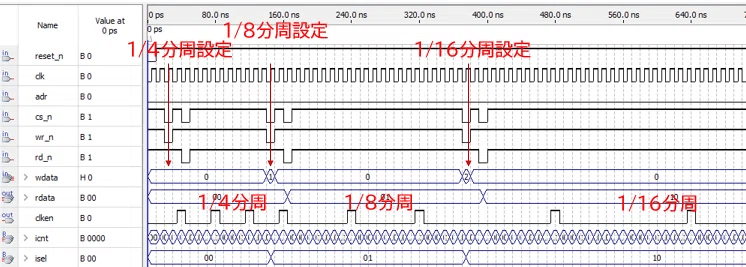
次にPWM発振回路のpwm_genです。1~4目のprocess文がレジスタ関連、5~7個目のprocess文でPWMを生成しています。
library IEEE;
use IEEE.STD_LOGIC_1164.ALL;
use IEEE.STD_LOGIC_ARITH.ALL;
use IEEE.STD_LOGIC_UNSIGNED.ALL;
entity pwm_gen is
port ( clk :in std_logic;
reset_n :in std_logic;
adr :in std_logic_vector(1 downto 0);
cs_n :in std_logic;
wr_n :in std_logic;
rd_n :in std_logic;
wdata :in std_logic_vector(7 downto 0);
rdata :out std_logic_vector(7 downto 0);
en :in std_logic;
pwm_out :out std_logic);
end pwm_gen;
architecture rtl of pwm_gen is
signal iperiod,iltime,ipcnt :std_logic_vector(7 downto 0);
signal iset,ipcmp,ipwm_out :std_logic;
begin
process(clk,reset_n)
begin
if reset_n = '0' then
iperiod <= (others => '0');
elsif rising_edge(clk) then
if adr="00" and cs_n ='0' and wr_n = '0' then
iperiod <= wdata;
end if;
end if;
end process;
process(clk,reset_n)
begin
if reset_n = '0' then
iltime <= (others => '0');
elsif rising_edge(clk) then
if adr="01" and cs_n ='0' and wr_n = '0' then
iltime <= wdata;
end if;
end if;
end process;
process(clk,reset_n)
begin
if reset_n = '0' then
iset <= '0';
elsif rising_edge(clk) then
if adr="10" and cs_n ='0' and wr_n = '0' then
iset <= wdata(0);
end if;
end if;
end process;
process(clk,reset_n)
begin
if reset_n = '0' then
rdata <= (others => '0');
elsif rising_edge(clk) then
if adr="00" and cs_n ='0' and rd_n = '0' then
rdata <= iperiod;
elsif adr="01" and cs_n ='0' and rd_n = '0' then
rdata <= iltime;
elsif adr="10" and cs_n ='0' and rd_n = '0' then
rdata <= "0000000"&iset;
end if;
end if;
end process;
--
process(clk,reset_n)
begin
if reset_n = '0' then
ipcnt <= "00000001";
elsif rising_edge(clk) then
if en ='1' and (iset = '0' or ipcmp = '1') then
ipcnt <= "00000001";
elsif en = '1' then
ipcnt <= ipcnt + '1';
end if;
end if;
end process;
process(ipcnt,iperiod)
begin
if ipcnt = iperiod then
ipcmp <= '1';
else ipcmp <= '0';
end if;
end process;
process(ipcnt,iltime)
begin
if ipcnt <= iltime then
ipwm_out <= '0';
else ipwm_out <= '1';
end if;
end process;
pwm_out <= ipwm_out and iset;
end rtl;
シミュレーション結果
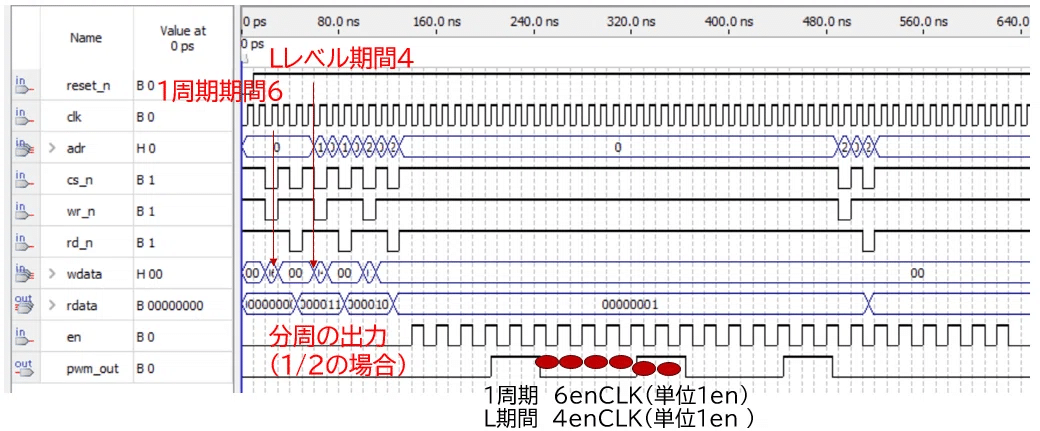
次に上記2つの分周・PWM発振回路を接続するTOP階層(pwm_top)のVHDLコードを示します。シンボル図・回路図に従って各モジュールに接続するだけです。
library IEEE;
use IEEE.STD_LOGIC_1164.ALL;
use IEEE.STD_LOGIC_ARITH.ALL;
use IEEE.STD_LOGIC_UNSIGNED.ALL;
entity pwm_top is
Port ( clk : in STD_LOGIC;
reset_n : in STD_LOGIC;
cs0_n : in STD_LOGIC;
cs1_n : in STD_LOGIC;
adr : in STD_LOGIC_VECTOR (1 downto 0);
wr_n : in STD_LOGIC;
rd_n : in STD_LOGIC;
wdata : in STD_LOGIC_VECTOR (7 downto 0);
rdata0 : out STD_LOGIC_VECTOR (1 downto 0);
rdata1 : out STD_LOGIC_VECTOR (7 downto 0);
pwm_out : out STD_LOGIC);
end pwm_top;
architecture rtl of pwm_top is
signal iclken : STD_LOGIC;
component en_gen
port ( clk :in std_logic;
reset_n :in std_logic;
adr :in std_logic;
cs_n :in std_logic;
wr_n :in std_logic;
rd_n :in std_logic;
wdata :in std_logic_vector(1 downto 0);
rdata :out std_logic_vector(1 downto 0);
clken :out std_logic);
end component;
component pwm_gen
port ( clk :in std_logic;
reset_n :in std_logic;
adr :in std_logic_vector(1 downto 0);
cs_n :in std_logic;
wr_n :in std_logic;
rd_n :in std_logic;
wdata :in std_logic_vector(7 downto 0);
rdata :out std_logic_vector(7 downto 0);
en :in std_logic;
pwm_out :out std_logic);
end component;
begin
u0:en_gen
port map( clk => clk,
reset_n => reset_n,
adr => adr(0),
cs_n => cs0_n,
wr_n => wr_n,
rd_n => rd_n,
wdata => wdata(1 downto 0),
rdata => rdata0,
clken => iclken);
u1:pwm_gen
port map( clk => clk,
reset_n => reset_n,
adr => adr,
cs_n => cs1_n,
wr_n => wr_n,
rd_n => rd_n,
wdata => wdata,
rdata => rdata1,
en => iclken,
pwm_out => pwm_out);
end rtl;
シミュレーション結果
TOP階層(pwm_top)でのシミュレーション結果です。狙った通りに動いていますね。
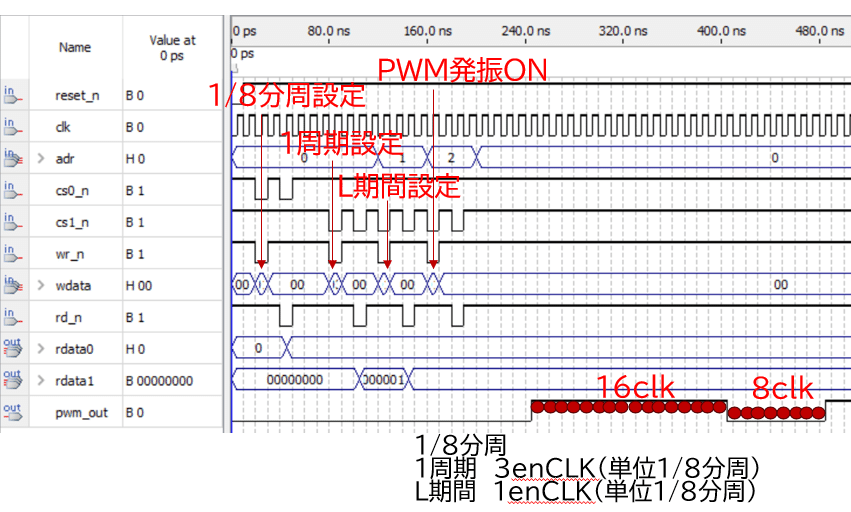
Verilogで書いてみる
まず分周回路から
VHDLコードをChatGPTでVerilog変換してみました。うまく変換できているようには見えます。
module en_gen (
input wire clk,
input wire reset_n,
input wire adr,
input wire cs_n,
input wire wr_n,
input wire rd_n,
input wire [1:0] wdata,
output reg [1:0] rdata,
output reg clken
);
reg [3:0] icnt;
reg i4en, i8en, i16en;
reg [1:0] isel;
// Process for writing to isel
always @(posedge clk or negedge reset_n) begin
if (!reset_n) begin
isel <= 2'b00;
end else if (!cs_n && !wr_n && adr == 1'b0) begin
isel <= wdata;
end
end
// Process for reading from isel
always @(posedge clk or negedge reset_n) begin
if (!reset_n) begin
rdata <= 2'b00;
end else if (!cs_n && !rd_n && adr == 1'b0) begin
rdata <= isel;
end
end
// Process for counting in icnt
always @(posedge clk or negedge reset_n) begin
if (!reset_n) begin
icnt <= 4'b0000;
end else begin
icnt <= icnt + 1'b1;
end
end
// Process for generating i4en
always @(*) begin
if (icnt[1:0] == 2'b11) begin
i4en = 1'b1;
end else begin
i4en = 1'b0;
end
end
// Process for generating i8en
always @(*) begin
if (icnt[2:0] == 3'b111) begin
i8en = 1'b1;
end else begin
i8en = 1'b0;
end
end
// Process for generating i16en
always @(*) begin
if (icnt == 4'b1111) begin
i16en = 1'b1;
end else begin
i16en = 1'b0;
end
end
// Process for selecting clken based on isel
always @(*) begin
case (isel)
2'b00: clken = i4en;
2'b01: clken = i8en;
2'b10: clken = i16en;
default: clken = i4en;
endcase
end
endmodule
次にPWM発振回路です。
VHDLコードをChatGPTでVerilog変換してみました。うまく変換できているようには見えます。
module pwm_gen (
input wire clk,
input wire reset_n,
input wire [1:0] adr,
input wire cs_n,
input wire wr_n,
input wire rd_n,
input wire [7:0] wdata,
output reg [7:0] rdata,
input wire en,
output wire pwm_out
);
reg [7:0] iperiod, iltime, ipcnt;
reg iset, ipcmp, ipwm_out;
// Process for writing to iperiod
always @(posedge clk or negedge reset_n) begin
if (!reset_n) begin
iperiod <= 8'b00000000;
end else if (!cs_n && !wr_n && adr == 2'b00) begin
iperiod <= wdata;
end
end
// Process for writing to iltime
always @(posedge clk or negedge reset_n) begin
if (!reset_n) begin
iltime <= 8'b00000000;
end else if (!cs_n && !wr_n && adr == 2'b01) begin
iltime <= wdata;
end
end
// Process for writing to iset
always @(posedge clk or negedge reset_n) begin
if (!reset_n) begin
iset <= 1'b0;
end else if (!cs_n && !wr_n && adr == 2'b10) begin
iset <= wdata[0];
end
end
// Process for reading from registers
always @(posedge clk or negedge reset_n) begin
if (!reset_n) begin
rdata <= 8'b00000000;
end else if (!cs_n && !rd_n) begin
case (adr)
2'b00: rdata <= iperiod;
2'b01: rdata <= iltime;
2'b10: rdata <= {7'b0000000, iset};
default: rdata <= 8'b00000000;
endcase
end
end
// Process for counting in ipcnt
always @(posedge clk or negedge reset_n) begin
if (!reset_n) begin
ipcnt <= 8'b00000001;
end else if (en && (iset == 1'b0 || ipcmp == 1'b1)) begin
ipcnt <= 8'b00000001;
end else if (en) begin
ipcnt <= ipcnt + 1'b1;
end
end
// Process for comparing ipcnt and iperiod
always @(*) begin
if (ipcnt == iperiod) begin
ipcmp = 1'b1;
end else begin
ipcmp = 1'b0;
end
end
// Process for generating ipwm_out
always @(*) begin
if (ipcnt <= iltime) begin
ipwm_out = 1'b0;
end else begin
ipwm_out = 1'b1;
end
end
// Output pwm_out
assign pwm_out = ipwm_out & iset;
endmodule
最後にTOP階層(分周回路+PWM発振回路)です。
VHDLコードをChatGPTでVerilog変換してみました。うまく変換できているようには見えます。
module pwm_top (
input wire clk,
input wire reset_n,
input wire cs0_n,
input wire cs1_n,
input wire [1:0] adr,
input wire wr_n,
input wire rd_n,
input wire [7:0] wdata,
output wire [1:0] rdata0,
output wire [7:0] rdata1,
output wire pwm_out
);
wire iclken;
// en_genモジュールのインスタンス化
en_gen u0 (
.clk(clk),
.reset_n(reset_n),
.adr(adr[0]),
.cs_n(cs0_n),
.wr_n(wr_n),
.rd_n(rd_n),
.wdata(wdata[1:0]),
.rdata(rdata0),
.clken(iclken)
);
// pwm_genモジュールのインスタンス化
pwm_gen u1 (
.clk(clk),
.reset_n(reset_n),
.adr(adr),
.cs_n(cs1_n),
.wr_n(wr_n),
.rd_n(rd_n),
.wdata(wdata),
.rdata(rdata1),
.en(iclken),
.pwm_out(pwm_out)
);
endmodule
おわりに
今回は分周回路とPWM発振回路のコンビとする回路をご紹介いたしました。いずれもよく使用するシーンが多いのでどういうものかを理解していただければと思います。ありがとうございました。
